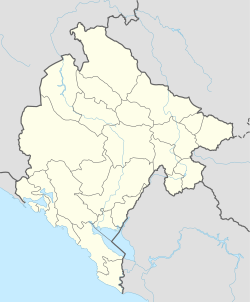
Montenegro is a country in Southeastern Europe. It is a part of the Balkans and is bordered by Bosnia and Herzegovina to the north, Serbia to the northeast, Kosovo to the east, Albania to the southeast, Croatia to the northwest, and the Adriatic Sea to the west with a coastline of 293.5 km. Podgorica, the capital and largest city, covers 10.4% of Montenegro's territory of 13,812 square kilometres (5,333 sq mi), and is home to roughly 31% of its total population of 621,000. Cetinje is the former royal capital of Montenegro and is the location of several national institutions, including the official residence of the president of Montenegro.

Serbia and Montenegro, known until 2003 as the Federal Republic of Yugoslavia, FR Yugoslavia or simply Yugoslavia, was a country in Southeast Europe located in the Balkans that existed from 1992 to 2006, following the breakup of the Socialist Federal Republic of Yugoslavia. The country bordered Hungary to the north, Romania to the northeast, Bulgaria to the southeast, Macedonia to the south, Croatia and Bosnia and Herzegovina to the west, and Albania to the southwest. The state was founded on 27 April 1992 as a federation comprising the Republic of Serbia and the Republic of Montenegro. In February 2003, it was transformed from a federal republic to a political union until Montenegro seceded from the union in June 2006, leading to the full independence of both Serbia and Montenegro.

Cetinje is a town in Montenegro. It is the former royal capital of Montenegro and is the location of several national institutions, including the official residence of the president of Montenegro. According to the 2011 census, the town had a population of 14,093 while the Cetinje Municipality had 16,657 residents as of 2011. Cetinje is the centre of Cetinje Municipality. The city rests on a small karst plain surrounded by limestone mountains, including Mount Lovćen, the legendary mountain in Montenegrin historiography. Cetinje was founded in the 15th century and became a cradle of the culture of Montenegro. Its status as the honorary capital of Montenegro is due to its heritage as a long-serving former capital of Montenegro.

Montenegrins are a South Slavic ethnic group that share a common Montenegrin culture, history, and language, identified with the country of Montenegro.
Montenegrin is a normative variety of the Serbo-Croatian language mainly used by Montenegrins and is the official language of Montenegro. Montenegrin is based on the most widespread dialect of Serbo-Croatian, Shtokavian, more specifically on Eastern Herzegovinian, which is also the basis of Standard Croatian, Serbian, and Bosnian.
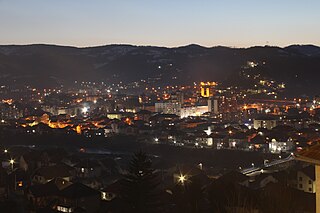
Bijelo Polje is a town in northeastern Montenegro on the Lim River. It has an urban population of 12,900. It is the administrative, economic, cultural and educational centre of northern Montenegro.
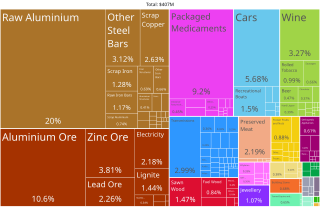
The economy of Montenegro is currently in a process of transition, as it navigates the impacts of the Yugoslav Wars, the decline of industry following the dissolution of the Yugoslavia, and economic sanctions imposed by the United Nations. Montenegro joined the World Trade Organization on 29 April 2012. Montenegro joined the North Atlantic Treaty Organization on 5 June 2017. The accession of Montenegro to the European Union is planned for 2025.
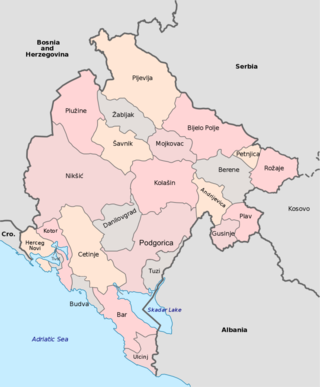
The municipalities are the first level administrative subdivisions of Montenegro. The country is divided into 25 municipalities including the Old Royal Capital Cetinje and the Podgorica Capital City. Podgorica is divided into one subdivision called city municipality, forming the most basic level of local government.

Montenegro has participated in the Eurovision Song Contest 12 times since its debut in 2007. Previously it had participated as part of Yugoslavia and as part of Serbia and Montenegro.

Islam in Montenegro refers to adherents, communities and religious institutions of Islam in Montenegro. It is the second largest religion in the country, after Christianity. According to the 2011 census, Montenegro's 118,477 Muslims make up 20% of the total population. Montenegro's Muslims belong mostly to the Sunni branch. According to the estimate by the Pew Research Center, Muslims have a population of 130,000 (20.3%) as of 2020.

The Montenegro national football team has represented Montenegro in international football since 2007. It is controlled by the Football Association of Montenegro, the governing body for football in Montenegro. Montenegro's home ground is Podgorica City Stadium in Podgorica.

The Socialist Republic of Montenegro, commonly referred to as Socialist Montenegro or simply Montenegro, was one of the six republics forming the Socialist Federal Republic of Yugoslavia and the nation state of the Montenegrins. It is a predecessor of the modern-day Montenegro.

Sergej Ćetković is a Montenegrin recording artist. He lives and works in the Serbian capital of Belgrade. Ćetković represented Montenegro in the Eurovision Song Contest 2014.
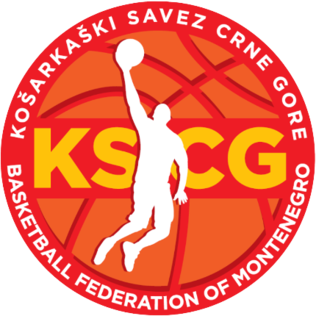
The Montenegro men's national basketball team represents Montenegro in international basketball tournaments. The supervising body is the Basketball Federation of Montenegro.
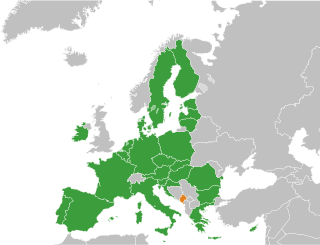
Accession of Montenegro to the European Union is on the current agenda for future enlargement of the EU.
The Montenegro Billie Jean King Cup team represents Montenegro in the Billie Jean King Cup tennis competition and are governed by the Tennis Federation of Montenegro. They currently compete in the Europe/Africa Zone of Group III.
Miss Montenegro is a national Beauty pageant in Montenegro.

Turks in Montenegro, also known as Turkish Montenegrins and Montenegrin Turks, are ethnic Turks who form an ethnic minority in Montenegro.
The Montenegro women's national basketball team represents Montenegro in international women's basketball tournaments. The supervising body is the Basketball Federation of Montenegro.
The Montenegrin women's national team entered international competition in 2008, playing their first official match on 27 August, against Republic of Ireland in Bijelo Polje (68–56).
The Montenegrin women's team participated at the EuroBasket Women four times – 2011, 2013, 2015, and 2017 reaching the quarterfinals twice.

The Albanian revolt of 1911 or the Malësori uprising of 1911 was one of many Albanian revolts in the Ottoman Empire and lasted from 24 March 1911 until 4 August 1911 in the region of Malësia.
